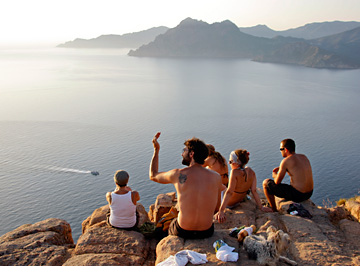A Bad Year Saved (Maybe)
Tom Swick: Contemplating and celebrating the world of travel
12.31.08 | 9:54 AM ET
 Travelers in Corsica. REUTERS/Charles Platiau
Travelers in Corsica. REUTERS/Charles PlatiauTravel became a major casualty in 2008—of both the recession and terrorism—but also a potential beneficiary (of the presidential election). For Americans with passports, the hanging of a new calendar will be a warily hopeful act.
The economy continues to slide, threatening airlines as well as banks. We sit and wait to see who falls, and what those airlines left flying will find to charge us for next. (Jetway use? Armrest privileges?)
The price of a roundtrip ticket to Europe this summer shocked people who hadn’t flown trans-Atlantic for a few years. Speaking at the first annual Melbourne Festival of Travel Writing in July, Lonely Planet founder Tony Wheeler suggested that the “golden age of cheap travel” may be coming to an end. It was a sobering prospect. When you come of age under the weight of a backpack, it is painful to think of travel as a luxury.
The great American road trip—less a luxury than a birthright—also took a hit this summer as gas prices exceeded $4 a gallon. The quandary—spend your savings to fly or a small fortune to drive—produced a rash of “regional travel” and “weekend getaway” stories in publications dedicated to pulling people up off the sofa. The New York Times Travel section, which has excelled at scouring the globe and finding clubs reminiscent of those in Manhattan, started an occasional series on ethnic neighborhoods within the five boroughs.
Everyone, it seemed, took a page from Thoreau. It was the year of the “staycation”—a failure as a neologism as well as a concept. You saw it written but never heard it spoken except by the trend addicts on TV and radio. No one this fall told you what they did on their summer staycation.
The leaders of the three major American automakers flew their private jets to Washington to beg for bailouts. While Smart cars started popping up in neighborhoods like Easter eggs.
Train travel gained in popularity, attracting a growing number of people concerned about their carbon footprints and a smaller but no less wiser group drawn to the pleasures of “slow travel” (a form which Amtrak sometimes elevates to an art).
Paul Theroux returned to the tracks of The Great Railway Bazaar and came back with the equally excellent Ghost Train to the Eastern Star. Yet while the new book may have sparked an interest in trains, it failed to do the same—as its predecessor had done—for travel writing.
November gave us our first global president, the darling of travelers (and most of the world’s citizens). On Nov. 5th it suddenly became OK to be an American abroad.
We had less than a month to glory in our newfound popularity before terrorists stormed the city of Mumbai, targeting a train station and two luxury hotels. The original report, that they were singling out Americans and Brits, proved to be false, though they did attack a Jewish center. And like that, a new, strangely retro image (old occupation movies came to mind) was added to the phobias of queasy travelers: that of a gunman in the corridor going door-to-door.
Though some called it “India’s 9/11,” Le Monde didn’t proclaim “We are all tourists.” Travelers have been obvious targets since the day they hit the road. (The word “thug” comes from thuggee, the bands in India that preyed on caravans, robbing and killing their members.) It’s just that today weaponry is more sophisticated, tourism more common, news more ubiquitous.
Obama won’t be able to put an end to terrorism, but he can do a lot to repair our country’s reputation in the world. (Though no American traveler should automatically expect a warm reception based on nationality, especially since we thought it unfair when the same thing sometimes got us the opposite.)
Our president-elect has expressed a willingness to engage the leaders of countries recently seen as enemies, which could go a long way in diffusing tensions. There is hope that, sometime during his administration, Americans will be able to visit Cuba legally. (A recent poll showed that a majority of Cuban-Americans are in favor of ending the embargo.) The environment is likely to become a major concern (finally), which could mean needed funding for national parks as well as electric cars. If he is able to revive the economy, travel—among other things—will become accessible to more and more people.
It is like that moment before a journey, when feelings of trepidation are overtaken by often unrealistic expectations.![]()